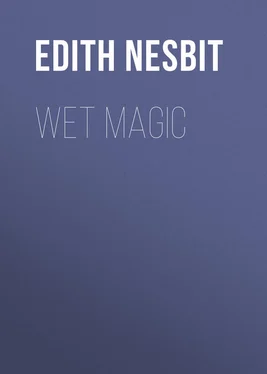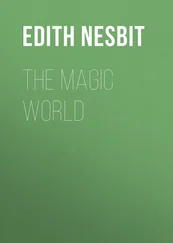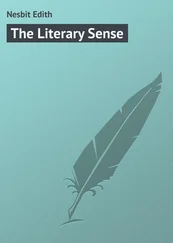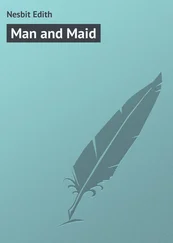Edith Nesbit - Wet Magic
Здесь есть возможность читать онлайн «Edith Nesbit - Wet Magic» — ознакомительный отрывок электронной книги совершенно бесплатно, а после прочтения отрывка купить полную версию. В некоторых случаях можно слушать аудио, скачать через торрент в формате fb2 и присутствует краткое содержание. ISBN: , Жанр: foreign_prose, на английском языке. Описание произведения, (предисловие) а так же отзывы посетителей доступны на портале библиотеки ЛибКат.
- Название:Wet Magic
- Автор:
- Жанр:
- Год:неизвестен
- ISBN:http://www.gutenberg.org/ebooks/50361
- Рейтинг книги:3 / 5. Голосов: 1
-
Избранное:Добавить в избранное
- Отзывы:
-
Ваша оценка:
- 60
- 1
- 2
- 3
- 4
- 5
Wet Magic: краткое содержание, описание и аннотация
Предлагаем к чтению аннотацию, описание, краткое содержание или предисловие (зависит от того, что написал сам автор книги «Wet Magic»). Если вы не нашли необходимую информацию о книге — напишите в комментариях, мы постараемся отыскать её.
Wet Magic — читать онлайн ознакомительный отрывок
Ниже представлен текст книги, разбитый по страницам. Система сохранения места последней прочитанной страницы, позволяет с удобством читать онлайн бесплатно книгу «Wet Magic», без необходимости каждый раз заново искать на чём Вы остановились. Поставьте закладку, и сможете в любой момент перейти на страницу, на которой закончили чтение.
Интервал:
Закладка:
Francis had released Bernard’s ear and now he turned to Mavis.
“So that’s it,” he said slowly – “who’s got her?”
“The circus people. What’s your news?” asked Kathleen eagerly.
“After brek,” said Francis. “Yes, Mother, half a sec! I apologize about the ear, Bernard. We will tell you all. Oh, it’s quite different from what you think. We meet and discuss the situation in the mill the minute we’re free from brek. Agreed? Right! Yes, Mother, coming!”
“Then there must,” Mavis whispered to Francis, “be two Mermaids. They can’t both be Sabrina … then which…?”
“We’ve got to save one of them anyhow,” Francis answered with the light of big adventure in his eye, “ they die in captivity .”
CHAPTER THREE
The Rescue
THE great question, of course, was – Would Mother take them to the circus, or would she, if she wouldn’t herself take them, let them go alone? She had once, in Buckinghamshire, allowed them to go to a traveling menagerie, after exacting from them a promise that they were not to touch any of the animals, and they had seen reason to regret their promise when the showman offered to let them stroke his tame performing wolf, who was so very like a collie. When they had said, “No, thank you,” the showman had said, “Oh, frightened, are you? Run along home to Mammy then!” and the bystanders had laughed in a most insulting way. At a circus, of course, the horses and things aren’t near enough for you to stroke them, so this time they might not be asked to promise. If Mother came with them her presence, though agreeable, would certainly add to the difficulties, already quite enough – as even Mavis could not but see – of rescuing the Mermaid. But suppose Mother didn’t come with them.
“Suppose we have to promise we won’t touch any of the animals?” suggested Cathay. “You can’t rescue a person without touching it.”
“That’s just it,” said Mavis, “a Mermaid isn’t an animal. She’s a person.”
“But suppose it isn’t that sort of Mermaid,” said Bernard. “Suppose it’s the sort that other people call seals, like it said in the paper.”
“Well, it isn’t,” said Francis briefly, adding, “so there!”
They were talking in the front garden, leaning over the green gate while Mother upstairs unpacked the luggage that had been the mound with spades on top only yesterday, at Waterloo.
“Mavis!” Mother called through the open window. “I can only find – but you’d better come up.”
“I ought to offer to help Mother unpack,” said Mavis, and went walking slowly.
She came back after a little while, however, quickly running.
“It’s all right,” she said. “Mother’s going to meet Daddy at the Junction this afternoon and buy us sunbonnets. And we’re to take our spades and go down to the sea till dinnertime – it’s roast rabbit and apple dumps – I asked Mrs. Pearce – and we can go to the circus by ourselves – and she never said a word about promise not to touch the animals.”
So off they went, down the white road where the yellowhammer was talking about himself as usual on the tree just beyond wherever you happened to be walking. And so to the beach.
Now, it is very difficult to care much about a Mermaid you have never seen or heard or touched. On the other hand, when once you have seen one and touched one and heard one speak, you seem to care for very little else. This was why when they got to the shore Kathleen and Bernard began at once to dig the moat of a sandcastle, while the elder ones walked up and down, dragging the new spades after them like some new kind of tail, and talking, talking, talking till Kathleen said they might help dig or the tide would be in before the castle was done.
“You don’t know what a lark sandcastles are, France,” she added kindly, “because you’ve never seen the sea before.”
So then they all dug and piled and patted and made molds of their pails to stand as towers to the castle and dug out dungeons and tunnels and bridges, only the roof always gave way in the end unless you had beaten the sand very tight beforehand. It was a glorious castle, though not quite finished when the first thin flat wash of the sea reached it. And then everyone worked twice as hard trying to keep the sea out till all was hopeless, and then everyone crowded into the castle and the sea washed it away bit by bit till there was only a shapeless island left, and everyone was wet through and had to change every single thing the minute they got home. You will know by that how much they enjoyed themselves.
After the roast rabbit and the apple dumplings Mother started on the sunbonnet-and-meet-Daddy expedition. Francis went with her to the station and returned a little sad.
“I had to promise not to touch any of the animals,” he said. “And perhaps a Mermaid is an animal.”
“Not if she can speak,” said Kathleen. “I say, don’t you think we ought to wear our best things – I do. It’s more respectable to the wonders of the deep. She’d like us to look beautiful.”
“I’m not going to change for anybody,” said Bernard firmly.
“All right, Bear,” said Mavis. “Only we will. Remember it’s magic.”
“I say, France,” he said, “do you think we ought to change?”
“No, I don’t,” Francis answered. “I don’t believe Mermaids care a bit what you’ve got on. You see, they don’t wear anything but tails and hair and looking glasses themselves. If there’s any beautifulness to be done they jolly well do it themselves. But I don’t say you wouldn’t be better for washing your hands again, and you might as well try to get some of the sand out of your hair. It looks like the wrong end of a broom as it is.”
He himself went so far as to put on the blue necktie that Aunt Amy had given him, and polished his silver watch chain on the inside of his jacket. This helped to pass the time till the girls were ready. At last this happened though they had put on their best things, and they started.
The yellowhammer went on about himself – he was never tired of the subject.
“It’s just as if that bird was making fun of us,” Bernard said.
“I daresay it is a wild-goose step we’re taking,” said Kathleen; “but the circus will be jolly, anyhow.”
There is a piece of wasteland just beyond Beachfield on the least agreeable side of that village – the side where the flat-faced shops are and the yellow brick houses. At the nice end of Beachfield the shops have little fat bow windows with greenish glass that you can hardly see through. Here also are gaunt hoardings plastered with tattered, ugly-colored posters, asking you in red to wear Ramsden’s Really Boots or to Vote for Wilton Ashby in blue. Some of the corners of the posters are always loose and flap dismally in the wind. There is always a good deal of straw and torn paper and dust at this end of the village, and bits of dirty rag, and old boots and tins are found under the hedges where flowers ought to be. Also there are a great many nettles and barbed wires instead of pleasant-colored fences. Don’t you sometimes wonder who is to blame for all the uglification of places that might be so pretty, and wish you could have a word with them and ask them not to? Perhaps when these people were little nobody told them how wrong it is to throw orange peel about, and the bits of paper off chocolate, and the paper bag which once concealed your bun. And it is a dreadful fact that the children who throw these things about are little uglifiers, and they grow up to be perfect monsters of uglification, and build hideous yellow brick cottages, and put up hoardings, and sell Ramsden’s Really Boots (in red), and vote passionately for Wilton Ashby (in blue), and care nothing for the fields that used to be green and the hedges where once flowers used to grow. Some people like this, and see nothing to hate in such ugly waste places as the one, at the wrong end of the town, where the fair was being held on that never-to-be-forgotten day when Francis, Mavis, Bernard and Kathleen set out in their best clothes to rescue the Mermaid because Mermaids “die in captivity.”
Читать дальшеИнтервал:
Закладка:
Похожие книги на «Wet Magic»
Представляем Вашему вниманию похожие книги на «Wet Magic» списком для выбора. Мы отобрали схожую по названию и смыслу литературу в надежде предоставить читателям больше вариантов отыскать новые, интересные, ещё непрочитанные произведения.
Обсуждение, отзывы о книге «Wet Magic» и просто собственные мнения читателей. Оставьте ваши комментарии, напишите, что Вы думаете о произведении, его смысле или главных героях. Укажите что конкретно понравилось, а что нет, и почему Вы так считаете.












